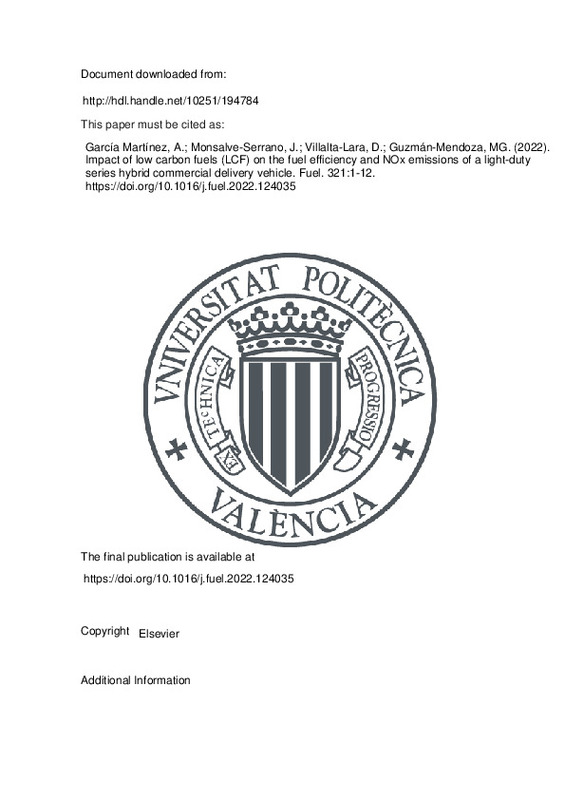JavaScript is disabled for your browser. Some features of this site may not work without it.
Buscar en RiuNet
Listar
Mi cuenta
Estadísticas
Ayuda RiuNet
Admin. UPV
Impact of low carbon fuels (LCF) on the fuel efficiency and NOx emissions of a light-duty series hybrid commercial delivery vehicle
Mostrar el registro sencillo del ítem
Ficheros en el ítem
| dc.contributor.author | García Martínez, Antonio
|
es_ES |
| dc.contributor.author | Monsalve-Serrano, Javier
|
es_ES |
| dc.contributor.author | Villalta-Lara, David
|
es_ES |
| dc.contributor.author | Guzmán-Mendoza, María Gabriela
|
es_ES |
| dc.date.accessioned | 2023-07-10T18:02:47Z | |
| dc.date.available | 2023-07-10T18:02:47Z | |
| dc.date.issued | 2022-08-01 | es_ES |
| dc.identifier.issn | 0016-2361 | es_ES |
| dc.identifier.uri | http://hdl.handle.net/10251/194784 | |
| dc.description.abstract | [EN] This work evaluates the potential of using four different low carbon fuels (LCF) in a series hybrid vehicle concept and compares the results to a conventional diesel combustion counterpart. To do this experimental data from a low NOx emission calibration is obtained for each of the different fuels, and 0-D vehicle simulations of an OPEL Movano van model are made to evaluate the performance, in terms of fuel consumption and engine-out NOx, during the Worldwide harmonized Light vehicles Test Cycles (WLTC) using a simplified engine map strategy. The vehicle selection allows to evaluate the scenario of a delivery application with three different payloads 0%, 50% and 100%. The work is motivated by the current automotive industry's need to reduce emissions and use energy resources efficiently, evaluating different strategies to fulfil both objectives. The evaluation of different energy sources -such as LCF- and powertrains, have been extensively researched topics, however the information is more scarce using a combination of both strategies. The results from this work show that series hybrid vehicle presents a reduction of fuel consumption of up to 5% with 100% payload, across all fuels tested. Nonetheless, engine-out emission levels of NOx show 16% worse performance for the hybrid case due to its operation at higher engine speeds and loads during the charging of the battery. | es_ES |
| dc.description.sponsorship | The authors thank ARAMCO Overseas Company for supporting this research. | es_ES |
| dc.language | Inglés | es_ES |
| dc.publisher | Elsevier | es_ES |
| dc.relation.ispartof | Fuel | es_ES |
| dc.rights | Reconocimiento - No comercial - Sin obra derivada (by-nc-nd) | es_ES |
| dc.subject | Low carbon fuel | es_ES |
| dc.subject | E-diesel | es_ES |
| dc.subject | Series hybrid vehicle | es_ES |
| dc.subject.classification | MAQUINAS Y MOTORES TERMICOS | es_ES |
| dc.title | Impact of low carbon fuels (LCF) on the fuel efficiency and NOx emissions of a light-duty series hybrid commercial delivery vehicle | es_ES |
| dc.type | Artículo | es_ES |
| dc.identifier.doi | 10.1016/j.fuel.2022.124035 | es_ES |
| dc.rights.accessRights | Abierto | es_ES |
| dc.contributor.affiliation | Universitat Politècnica de València. Escuela Técnica Superior de Ingeniería del Diseño - Escola Tècnica Superior d'Enginyeria del Disseny | es_ES |
| dc.description.bibliographicCitation | García Martínez, A.; Monsalve-Serrano, J.; Villalta-Lara, D.; Guzmán-Mendoza, MG. (2022). Impact of low carbon fuels (LCF) on the fuel efficiency and NOx emissions of a light-duty series hybrid commercial delivery vehicle. Fuel. 321:1-12. https://doi.org/10.1016/j.fuel.2022.124035 | es_ES |
| dc.description.accrualMethod | S | es_ES |
| dc.relation.publisherversion | https://doi.org/10.1016/j.fuel.2022.124035 | es_ES |
| dc.description.upvformatpinicio | 1 | es_ES |
| dc.description.upvformatpfin | 12 | es_ES |
| dc.type.version | info:eu-repo/semantics/publishedVersion | es_ES |
| dc.description.volume | 321 | es_ES |
| dc.relation.pasarela | S\460119 | es_ES |
| dc.contributor.funder | ARAMCO Overseas Company | es_ES |







![[Cerrado]](/themes/UPV/images/candado.png)

